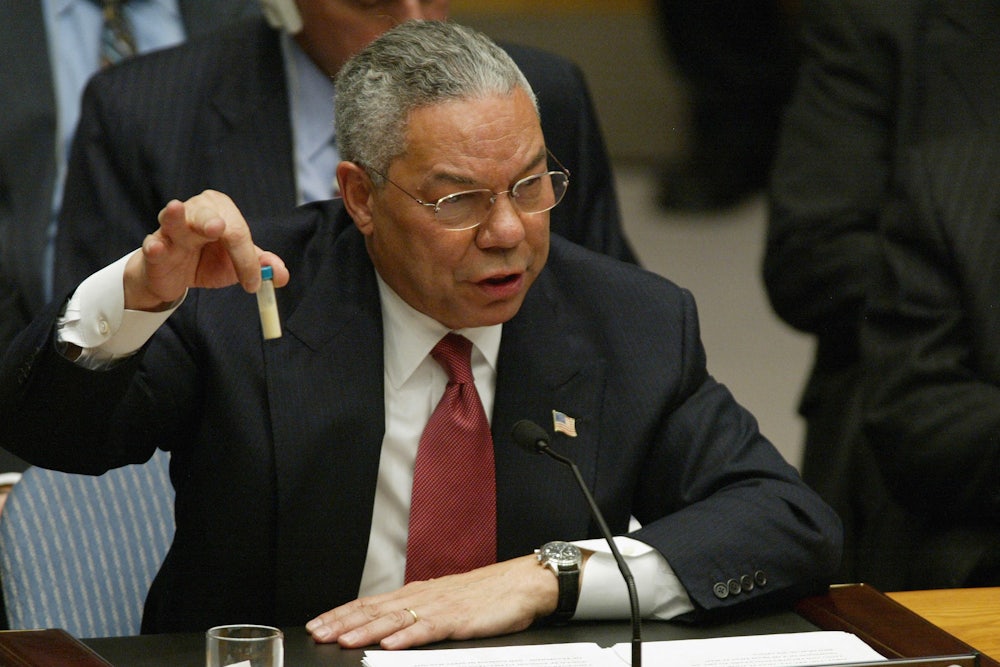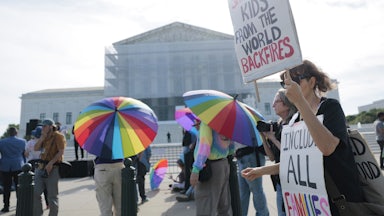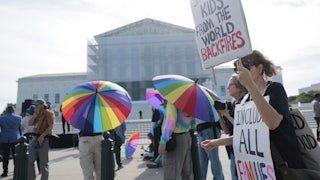The passing of former Secretary of State Colin Powell has provided the occasion for reflection on the man’s most consequential act, which also happened to be his most shameful one: his February 2003 speech at the United Nations, in which he persuasively laid out an array of phony evidence that the Iraqis harbored a substantial cache of weapons of mass destruction, or WMDs, emphatically calling for war in response.
Despite Powell’s apparent misgivings behind closed doors, the influential figure wholly legitimized the warmongering fervor manufactured by jingoistic smut-peddlers throughout the Bush administration and their parrots in the media. He relayed an unflappable certainty as he described covert manufacturing processes that hadn’t taken place, misrepresented intercepted conversations, and repeated sketchy conjecture as airtight truth. In doing so, Powell essentially laundered the dubious case for a simultaneously preemptive and retaliatory military response, lending his personal credibility to coax naysayers into cheering on an invasion. This is precisely the reason he was tapped for the task, and by all accounts it provided the necessary political cover for what would become the brutal, colossal mess whose consequences still reverberate violently, nearly two decades and a million deaths later.
Powell’s later recollection of the episode as “painful” and “a blot on my record” hardly feels strong enough. It’s impossible to look back at this era and not want to scream bloody murder at Powell and his fellows, who concocted an amateurish argument that Iraq possessed WMDs out of elisions and guesswork. This was the motivated reasoning of ultrarich freaks drooling all over themselves at the prospect of landing plush military contracts and installing yes-men into new global markets.
As someone too young to have lived through Powell’s apparently fabled early statesman phase, I’ve learned little from his legacy beyond two stupefyingly obvious lessons: The threshold for insisting that a hostile foreign power is hoarding weapons to attack us ought to be incredibly high, and onlookers ought to call bullshit when those standards aren’t met. So I hope you’ll forgive me for being downright apoplectic to be watching this mendacious chapter of our very recent history repeating itself as “Havana Syndrome,” with a new generation of reprobates shoving make-believe weapons down our throats, recklessly swearing that these are causing a series of mysterious attacks, none of which actually happened.
For nearly five years now, broad swaths of the media and federal government have pushed the idea that cutting-edge directed energy weapons—heretofore unknown to science and supposedly developed and wielded in secrecy by Russia or China—are behind extremely common medical symptoms experienced by U.S. diplomatic and intelligence officials stationed across the world. Beginning at the tail end of 2016, just as the Trump administration threatened to dramatically upend years of U.S. policy toward Cuba, individuals working there began reporting things like headaches, dizziness, fatigue, and brain fog—symptoms that can drive immense suffering but are unfortunately among the most widespread medical complaints on earth.
Because some of them recounted a high-pitched screeching sound sometime around the onset of symptoms, the improbable “high-tech weapons” thesis got entrenched early on. (That a patient-provided recording of the noise was later found by two separate investigative teams to be crickets did dismayingly little to dislodge this notion.)
Once employees in Cuba were warned to be hypervigilant about surveilling for symptoms that, according to what they’d been told, could indicate they were being targeted by a hostile foreign power, cases unsurprisingly spread as more and more presumably terrified people came forward feeling ill. In some cases, it seems likely that symptoms were triggered by stress, depression, or anxiety; in others, symptoms of any number of things were probably wrongfully ascribed to attacks. In short, as Robert Bartholomew and Robert Baloh have persuasively argued, “Havana Syndrome” fits the classic pattern of mass sociogenic illness. The alleged directed energy weapons are as real as demonic hexes were in late-seventeenth-century Salem.
But maddeningly, the contention that such conditions as migraines are actually proof of targeted attacks has stuck. Just as in 2003, this was wrought from a toxic combination of bad intelligence and bad actors with a vested interest in doubling down on it: Marco Rubio, who got on board early as an excuse to do anti-Cuba chest-thumping (“There’s no way the Cubans don’t know who did it—if they didn’t do it themselves,” he declared in 2018) and now chairs the Senate committee investigating the issue, or national security hawk Jeanne Sheehan, are good examples. Their bluster—as well as that of breathless media dupes like Julia Ioffe and Adam Entous giddily trumpeting the “directed energy weapons” narrative in sensational magazine features—has never been remotely matched by credible evidence nor defeated by its absence. It’s a nostalgic redux of Donald Rumsfeld’s treatise on “known unknowns” from the Iraq War era, reheated for public consumption.
More insidiously, the paranoid rhetoric around “Havana Syndrome” has escalated in recent months. Both lawmakers and sycophantic reporters hedge less and less when describing the health incidents as “attacks,” going so far as to name specific countries suspected of being involved. Former acting Defense Secretary Christopher Miller referred to one alleged case in suburban Virginia as an “act of war.” “Havana Syndrome” has reportedly been a topic of agitation during tense meetings with Russian officials. Concern over cases once delayed Vice President Kamala Harris’s diplomatic trip to Vietnam. Rubio accused high-profile skeptics of being paid by foreign governments to pump out disinformation. (For the record, I am not.)
Meanwhile, a CIA probe is intensifying and patients and their allies are calling for “possible policy responses” in retaliation. A bill calling for sanctions against whoever “directed or carried out the Havana Syndrome attacks” is reportedly in the Foreign Affairs Committee. And perhaps most shockingly, a new story this week from Ioffe anonymously quoted an intelligence officer explicitly advocating preemptive action against Russia, even though there’s no evidence at hand to support a casus belli: “So far, civilian leaders feel the evidence is circumstantial and the product of a process of elimination, and therefore not enough to assign blame publicly. But some in the intelligence community are getting restless, eager to see the people who wounded so many of their comrades punished. ‘Even if the intelligence is “medium confidence,”’ one member of the community told me, that should be enough to go on. ‘We got bin Laden with medium confidence.’”
Of course, we also invaded Iraq with “medium confidence.” And the case that “Havana Syndrome” is caused by any “attacks” at all is infinitely thinner than the one Colin Powell made for WMDs before the U.N., which at least involved weapons that adhered to the laws of physics. If “Havana Syndrome” has mercifully yet to be used to agitate for war as concretely as the imaginary nukes of Iraq were, it’s clearly been seized on by a national security apparatus formidably expanded since 9/11—and if more people don’t come to their senses, harm will surely result. It’s one thing for a former secretary of defense to toot idly about an “act of war” on America’s suburbs—more sitting leaders echoing him could obligate a more serious response. This is the dire crossroads to which we’re being thoughtlessly dragged. Eighteen years ago, too many people gave Colin Powell and others the benefit of the doubt. Today, “Havana Syndrome” promoters deserve none of it.










